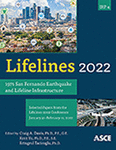Probabilistic Resilience Distance Measures and Application to Rural Power Distribution System
Publication: Lifelines 2022
ABSTRACT
Rural power distribution systems are evidentially vulnerable to extreme hazards, particularly hurricanes in coastal regions due to low or zero redundancy, low resourcefulness, and aged infrastructure. Some resilience measures exist for quantifying the resilience of infrastructure systems, which can be applied to these rural distribution systems. However, objective decisions based on such measurements are not ready to make due to the lack of framework to assess the change in resilience measure effectively while altering the information of the input parameters. Hence the questions, such as if the infrastructure system is more resilient when subject to some changed input parameters and, if obtained resilience measure is the optimal value for the given infrastructure system considering the available constraints, are not readily answered in terms of existing measures. Thus, this study explores several statistical and information-theoretic distance measures to characterize how a system evolves as a function of system variables from the realm of materials, hazards, or socioeconomic resourcefulness. Numerical evaluation is conducted with stochastically modeled rural distribution systems, which confirms the effectiveness of the proposed framework. Two resilience distance measures, Cramer-Von Mises Distance (CVMD) and Earth Mover’s Distance (EMD), are selected and recommended.
Get full access to this article
View all available purchase options and get full access to this chapter.
REFERENCES
Britt, E. (2017). “Hurricanes Harvey and Irma: Electric Industry Impacts, Restoration, and Cost Recovery.” Infrastructre, 57(1).
Cimellaro, G. P., Reinhorn, A. M., and Bruneau, M. (2010). “Framework for analytical quantification of disaster resilience.” Engineering Structures, 32(11), 3639-3649.
Cimellaro, G. P., Reinhorn, A. M., and Bruneau, M. (2010). “Seismic resilience of a hospital system.” Structure and Infrastructure Engineering, 6(1-2), 127-144.
Danica Coto. (2018). “Lights slowly come on for Puerto Ricans in rural areas.” <https://www.csmonitor.com/USA/2018/0716/Lights-slowly-come-on-for-Puerto-Ricans-in-rural-areas>.
Decò, A., Bocchini, P., and Frangopol, D. M. (2013). “A probabilistic approach for the prediction of seismic resilience of bridges.” Earthquake Engineering & Structural Dynamics, 42(10), 1469-1487.
Deza, M. M., and Deza, E. (2009). Encyclopedia of Distances, Springer Berlin Heidelberg.
Imaizumi, M., Ota, H., and Hamaguchi, T. (2019). “Hypothesis Test and Confidence Analysis with Wasserstein Distance with General Dimension.” arXiv:1910.07773.
Kwasinski, A. (2016). “Quantitative Model and Metrics of Electrical Grids’ Resilience Evaluated at a Power Distribution Level.” Energies, 9(2), 93.
Mensah, A. F., and Dueñas-Osorio, L. (2016). “Efficient Resilience Assessment Framework for Electric Power Systems Affected by Hurricane Events.” Journal of Structural Engineering, 142(8), C4015013.
Ouyang, M., and Dueñas-Osorio, L. (2014). “Multi-dimensional hurricane resilience assessment of electric power systems.” Structural Safety, 48, 15-24.
Ouyang, M., Dueñas-Osorio, L., and Min, X. (2012). “A three-stage resilience analysis framework for urban infrastructure systems.” Structural Safety, 36-37, 23-31.
Panteli, M., and Mancarella, P. (2017). “Modeling and Evaluating the Resilience of Critical Electrical Power Infrastructure to Extreme Weather Events.” IEEE Systems Journal, 11(3), 1733-1742.
Ramdas, A., Trillos, N. G., and Cuturi, M. (2017). “On Wasserstein Two-Sample Testing and Related Families of Nonparametric Tests.” Entropy, 19(2), 47.
Reed, D. A., Kapur, K. C., and Christie, R. D. (2009). “Methodology for Assessing the Resilience of Networked Infrastructure.” IEEE Systems Journal, 3(2), 174-180.
Sharma, P., and Chen, Z. (2020). “Probabilistic Resilience Measurement for Rural Electric Distribution System Affected by Hurricane Events.” ASCE-ASME Journal of Risk and Uncertainty in Engineering Systems, Part A: Civil Engineering, 6(2), 04020021.
Sheskin, D. J. (2000). Handbook of parametric and nonparametric statistical procedures, 2nd ed, Chapman & Hall/CRC, Boca Raton, FL.
Tabandeh, A., and Gardoni, P. (2018). “Resilience analysis: a mathematical formulation to model resilience of engineering systems AU - Sharma, Neetesh.” Sustainable and Resilient Infrastructure, 3(2), 49-67.
Zona, A., Kammouh, O., and Cimellaro, G. P. (2019). “Quantification of Resourcefulness for community Resilience framework.” 2019 Engineering Mechanics Institute and Geoinstitute Speciality Conference, Pasadena, California.
Information & Authors
Information
Published In
History
Published online: Nov 16, 2022
Authors
Metrics & Citations
Metrics
Citations
Download citation
If you have the appropriate software installed, you can download article citation data to the citation manager of your choice. Simply select your manager software from the list below and click Download.
